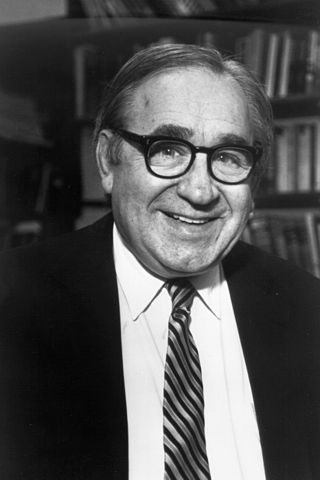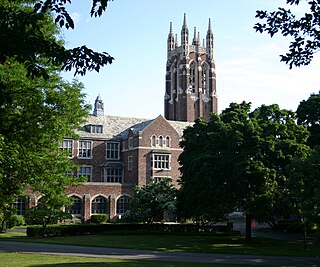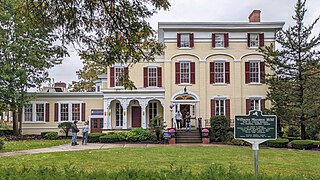
Arnold Joseph Toynbee was an English historian, a philosopher of history, an author of numerous books and a research professor of international history at the London School of Economics and King's College London. From 1918 to 1950, Toynbee was considered a leading specialist on international affairs; from 1929 to 1956 he was the Director of Studies at Chatham House, in which position he also produced 34 volumes of the Survey of International Affairs, a "bible" for international specialists in Britain.

Hamilton College is a private liberal arts college in the Clinton, New York, area. It was established as the Hamilton-Oneida Academy in 1793 and received its charter as Hamilton College in 1812, in honor of Alexander Hamilton, one of its inaugural trustees, following a proposal made after his death in 1804. Since 1978, Hamilton has been a coeducational institution, having merged with its sister school, Kirkland College.

Robert William Fogel was an American economic historian and winner of the 1993 Nobel Memorial Prize in Economic Sciences. As of his death, he was the Charles R. Walgreen Distinguished Service Professor of American Institutions and director of the Center for Population Economics (CPE) at the University of Chicago's Booth School of Business. He is best known as an advocate of new economic history (cliometrics) – the use of quantitative methods in history.

The National Technical Institute for the Deaf (NTID) is the first and largest technological college in the world for students who are deaf or hard of hearing. As one of nine colleges within the Rochester Institute of Technology (RIT) in Rochester, New York, NTID provides academic programs, access, ASL in-class interpreters and support services—including on-site audiological, speech-language, and cochlear implant support. As of fall quarter 2012, NTID encompasses just under 10% of RIT's enrollment, 1259 students. Roughly 775 deaf and hard of hearing students are cross-registered into another RIT college's program with support from NTID.

Stanley Maurice Elkins was an American historian, best known for his unique and controversial comparison of slavery in the United States to Nazi concentration camps, and for his collaborations with Eric McKitrick regarding the early American Republic. They together wrote The Age of Federalism, on the history of the founding fathers of America. He obtained his BA from Harvard University and his Ph.D. in history from Columbia University. Elkins first taught at the University of Chicago but spent most of his career as a professor of history at Smith College in Northampton, MA, where he raised his family and eventually retired.
Stanley Lewis Engerman was an American economist and economic historian. He was known for his quantitative historical work along with Nobel Prize-winning economist Robert Fogel. His first major book, co-authored with Robert Fogel in 1974, was Time on the Cross: The Economics of American Negro Slavery. This significant work, winner of the Bancroft Prize in American history, challenged readers to think critically about the economics of slavery. Engerman has also published over 100 articles and has authored, co-authored or edited 16 book-length studies.
Sidney Wilfred Mintz was an American anthropologist best known for his studies of the Caribbean, creolization, and the anthropology of food. Mintz received his PhD at Columbia University in 1951 and conducted his primary fieldwork among sugar-cane workers in Puerto Rico. Later expanding his ethnographic research to Haiti and Jamaica, he produced historical and ethnographic studies of slavery and global capitalism, cultural hybridity, Caribbean peasants, and the political economy of food commodities. He taught for two decades at Yale University before helping to found the Anthropology Department at Johns Hopkins University, where he remained for the duration of his career. Mintz's history of sugar, Sweetness and Power, is considered one of the most influential publications in cultural anthropology and food studies.

Colgate Rochester Crozer Divinity School is a Baptist seminary in Rochester, New York. It is affiliated with the American Baptist Churches USA.
Time on the Cross: The Economics of American Negro Slavery (1974) is a book by the economists Robert Fogel and Stanley L. Engerman. Fogel and Engerman argued that slavery was an economically rational institution and that the economic exploitation of slaves was not as catastrophic as presumed, because there were financial incentives for slaveholders to maintain a basic level of material support for those they held as property. The book was reprinted in 1995 at its twentieth anniversary. The book contradicts the long-standing notion that slavery was economically backwards, underdeveloped the South, and was on the path to extinction before the Civil War broke out. It attracted widespread attention in the media and generated heated controversy and criticism for its methodology and conclusions.

David Brion Davis was an American intellectual and cultural historian, and a leading authority on slavery and abolition in the Western world. He was a Sterling Professor of History at Yale University, and founder and director of Yale's Gilder Lehrman Center for the Study of Slavery, Resistance, and Abolition.
Herbert George Gutman (1928–1985) was an American professor of history at the Graduate Center of the City University of New York, where he wrote on slavery and labor history.

David Turnbull (1793–1851) was a leading 19th-century abolitionist and a British consul to Cuba. Turnbull, a Scotsman, was a key participant at the 1840 World Anti-Slavery Convention of the Anti-Slavery Society. Turnbull was blamed for creating a revolt in Cuba that resulted in 1844 being known as the Year of the Lash.
Stanley Diamond was an American poet and anthropologist. As a young man, he identified as a poet, and his disdain for the fascism of the 1930s greatly influenced his thinking. Diamond was a professor at several universities, spending most of his career at The New School. He wrote several books and founded Dialectical Anthropology, a Marxist anthropology journal, in 1975.

Slave breeding was the practice in slave states of the United States of slave owners systematically forcing slaves to have children to increase their wealth. It included coerced sexual relations between enslaved men and women or girls, forced pregnancies of enslaved women and girls due to forced inter inbreeding with fellow slaves in hopes of producing relatively stronger future slaves. The objective was for slave owners to increase the number of people they enslaved without incurring the cost of purchase, and to fill labor shortages caused by the abolition of the Atlantic slave trade.

The Battle of St. Kitts or St. Cristopher was a successful Spanish expedition that seized the islands of Saint Kitts and Nevis from the English and French during the Anglo-Spanish War (1625–30).

The Alexander Hamilton Institute for the Study of Western Civilization is a think tank in Clinton, New York, founded in 2007. It is independent of Hamilton College in Clinton.
The political views of American academics began to receive attention in the 1930s, and investigation into faculty political views expanded rapidly after the rise of McCarthyism. Demographic surveys of faculty that began in the 1950s and continue to the present have found higher percentages of liberals than of conservatives, particularly among those who work in the humanities and social sciences. Researchers and pundits disagree about survey methodology and about the interpretations of the findings.
Dana Lee Robert is an American historian of Christianity and a missiologist. She is a professor at Boston University, where she has worked since 1984. Together with her husband, M. L. Daneel, she co-founded the Center for Global Christianity and Mission in 2001, one of the first university-based Centers on World Christianity in North America. For years, Robert held the School of Theology's Truman Collins Professorship in World Christianity and History of Mission, but in 2022 she was installed in the William Fairfield Warren Distinguished Professorship, the highest distinction bestowed upon senior faculty members who remain actively involved in research, scholarship, teaching, and the University’s civic life.
Critical juncture theory focuses on critical junctures, i.e., large, rapid, discontinuous changes, and the long-term causal effect or historical legacy of these changes. Critical junctures are turning points that alter the course of evolution of some entity. Critical juncture theory seeks to explain both (1) the historical origin and maintenance of social order, and (2) the occurrence of social change through sudden, big leaps.
Capitalism and Slavery is the published version of the doctoral dissertation of Eric Williams, who was the first Prime Minister of Trinidad and Tobago in 1962. It advances a number of theses on the impact of economic factors on the decline of slavery, specifically the Atlantic slave trade and slavery in the British West Indies, from the second half of the 18th century. It also makes criticisms of the historiography of the British Empire of the period: in particular on the use of the Slavery Abolition Act of 1833 as a sort of moral pivot; but also directed against a historical school that saw the imperial constitutional history as a constant advance through legislation. It uses polemical asides for some personal attacks, notably on the Oxford historian Reginald Coupland. Seymour Drescher, a prominent critic among historians of some of the theses put forward in Capitalism and Slavery by Williams, wrote in 1987: "If one criterion of a classic is its ability to reorient our most basic way of viewing an object or a concept, Eric Williams's study supremely passes that test."










